Falling Rocket Debris Diverts Dozens Of Flights After Spectacular SpaceX Starship Explosion
SpaceX said the craft had an “unscheduled disassembly” shortly after taking off from its base in Texas.
The seventh launch of SpaceX's Starship rocket ended in disaster yesterday after the craft exploded less than nine minutes into the flight, scattering debris above the Caribbean. The Federal Aviation Administration delayed and diverted flights as a result of the explosion so that planes weren't caught up by the falling rocket debris.
The SpaceX Starship rocket comprises two sections: a Super Heavy booster that is designed to land back on Earth once it's completed its purpose and an upper stage that's simply called the Ship.
The launch was supposed to feature a pass over the Gulf Of Mexico and the release of 10 dummy satellites to assess a new system for deployment, reports the Guardian. Things started well; the rocket lifted off cleanly and the two stages separated correctly. The Super Heavy booster even made it back to the launch pad in a slick choreographed landing.
Just eight minutes after takeoff, however, the launch started to unravel when the ship's engines cut out. The craft ultimately exploded in a spectacular scene that looked fresh from a Michael Bay movie, as the Guardian adds:
Elon Musk's company said the spacecraft's six engines appeared to shut down one by one, with contact lost just 8min 30sec into the flight.
"We did lose all communications with the ship – that is essentially telling us we had an anomaly with the upper stage," SpaceX communications manager Dan Huot said, confirming minutes later that the ship was lost.
Scenes from the explosion were shared online last night, with the remnants of the ship lighting up the skies above the Caribbean. Hundreds of brightly glowing rocket fragments were strewn across the sky, which might have looked stunning but caused all kinds of headaches for air traffic controllers in the area.
Following the rocket's "unscheduled disassembly," the fragments re-entering the atmosphere caused widespread disruption to air traffic in the region, adds Reuters. Flights were delayed and diverted around the field of debris, as the site explains:
Dozens of commercial flights diverted to other airports or altered course to avoid potential debris, according to flight tracking website FlightRadar24. Departures from airports in Miami and Fort Lauderdale, Florida, were also delayed by about 45 minutes, it added.
The Federal Aviation Administration, which regulates private launch activities, said it had briefly slowed and diverted planes around the area where space debris was falling, but normal operations had since resumed.
The explosion comes just days after the incoming transportation secretary said that they would reevaluate fines that SpaceX had been handed by the Federal Aviation Administration over its launches in Texas. The private space company was fined more than $630,000 for allegedly failing to comply with safety regulations on two launches last year.
SpaceX has also come under fire for the emissions released by its launches, with regulators finding that the company's rockets are punching holes in our atmosphere.
